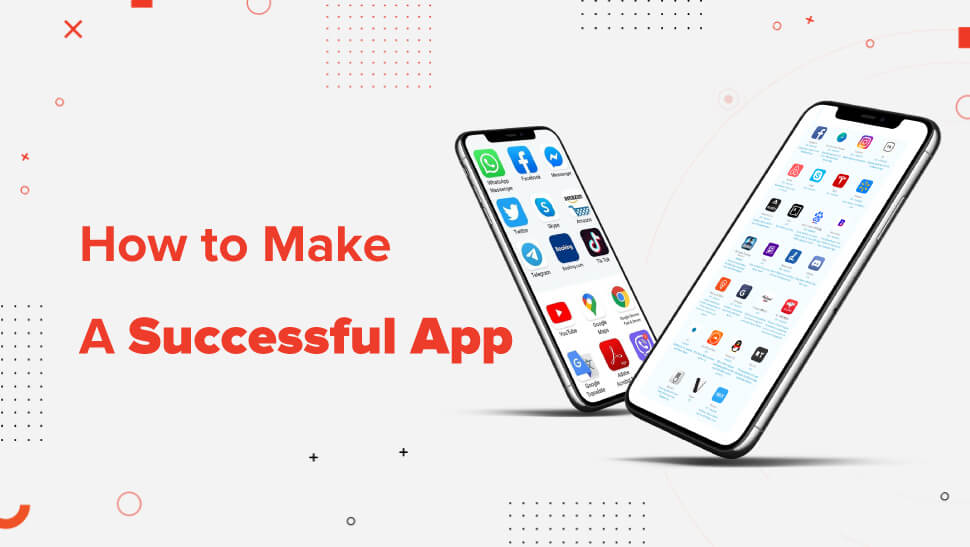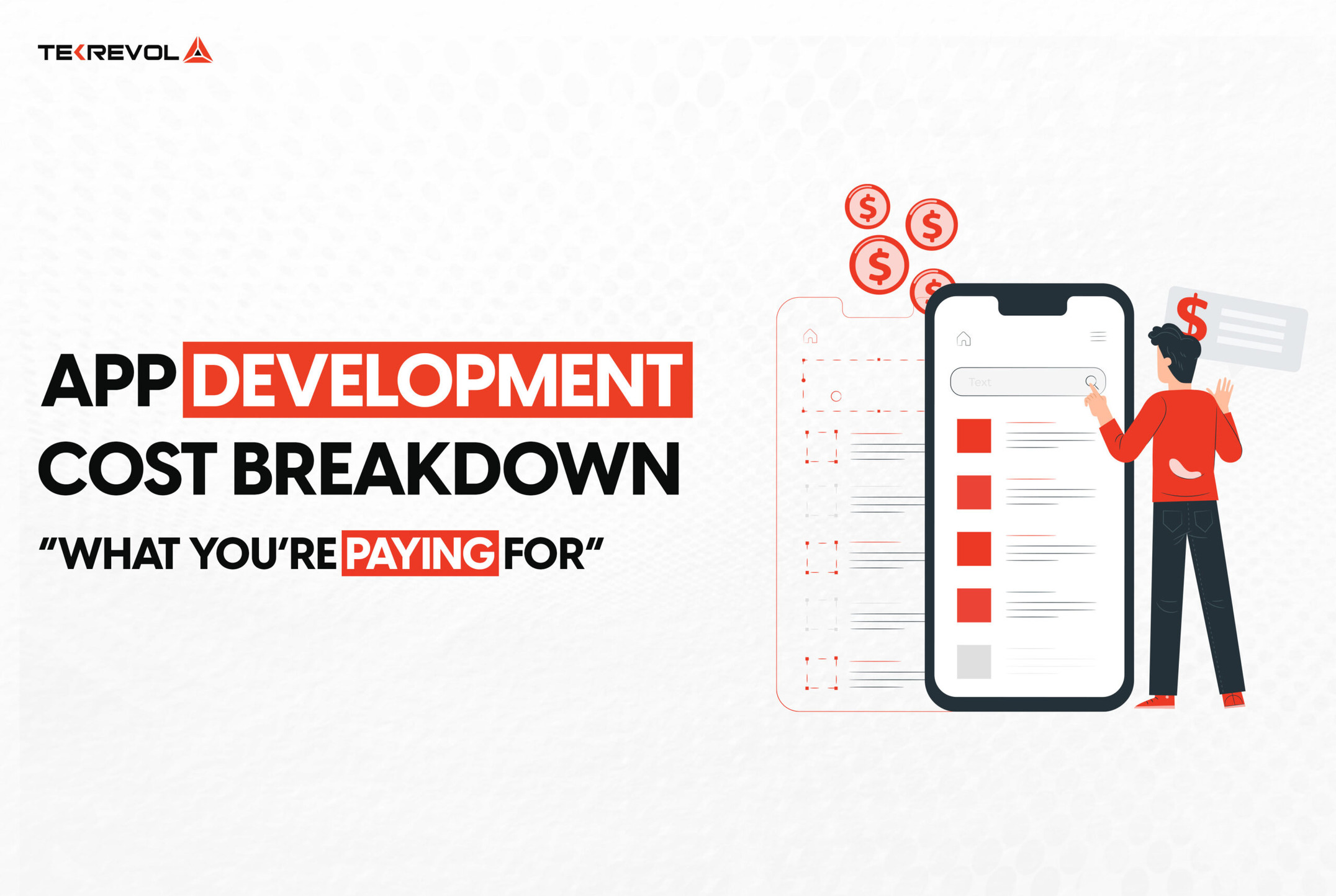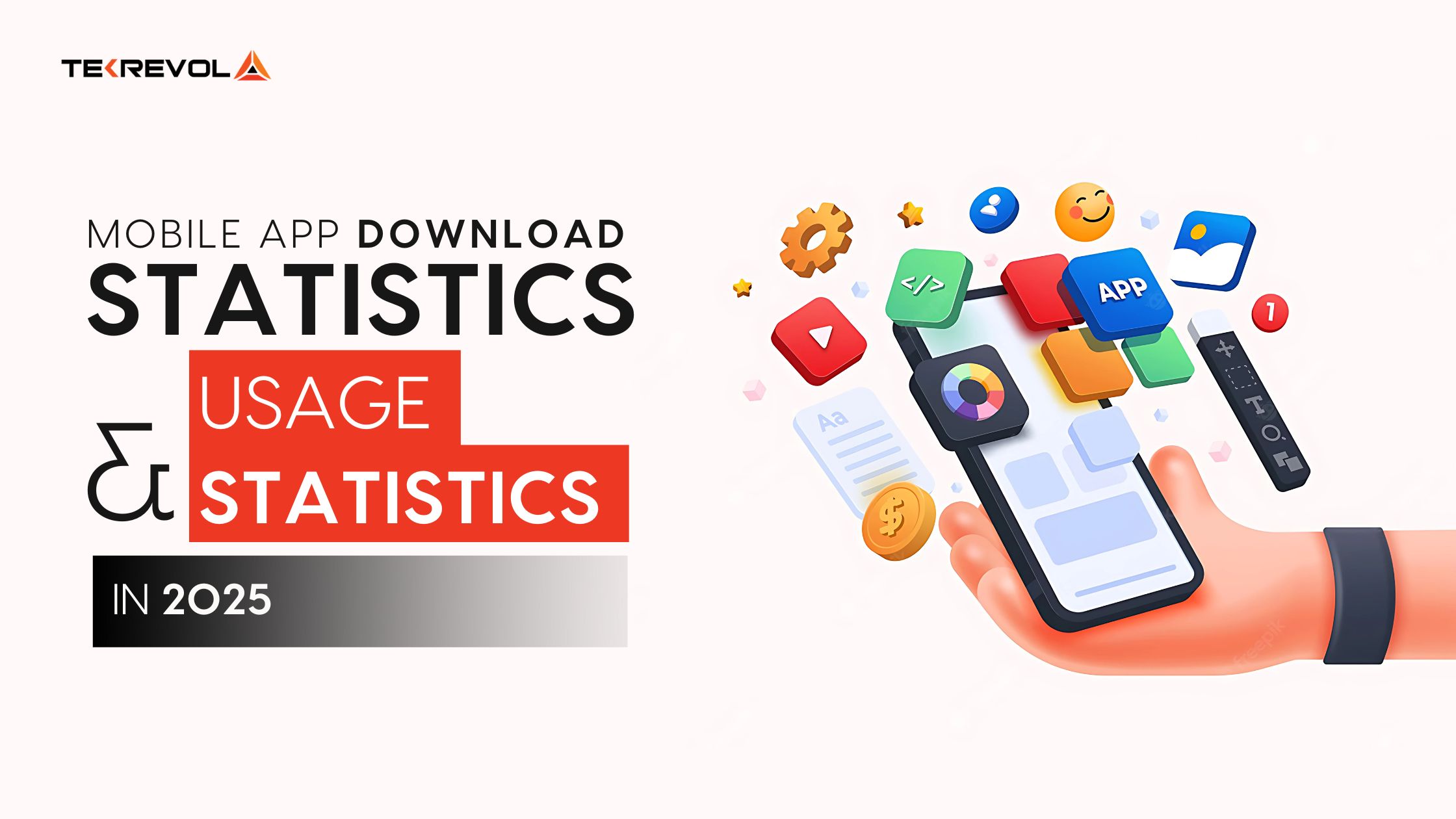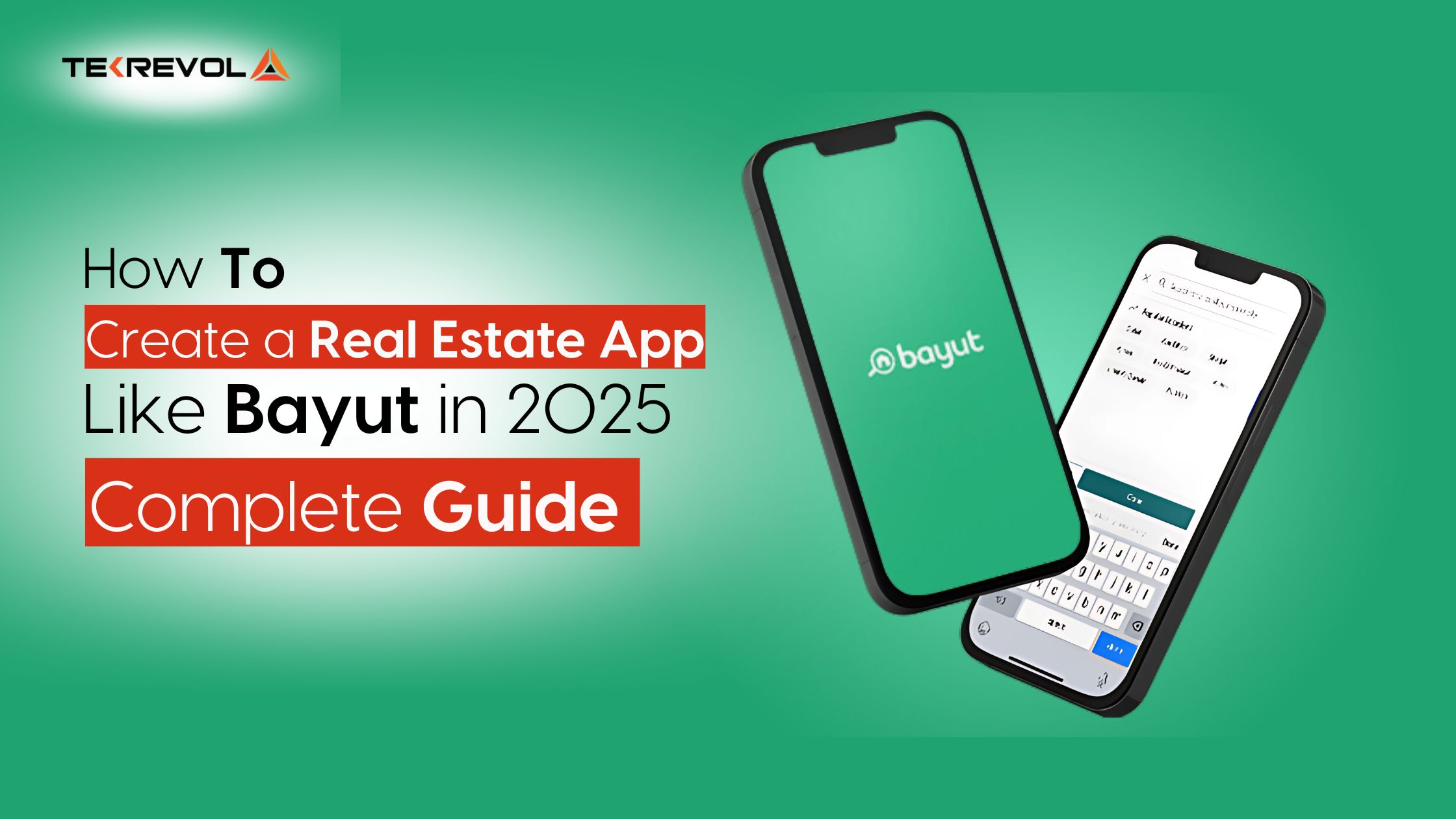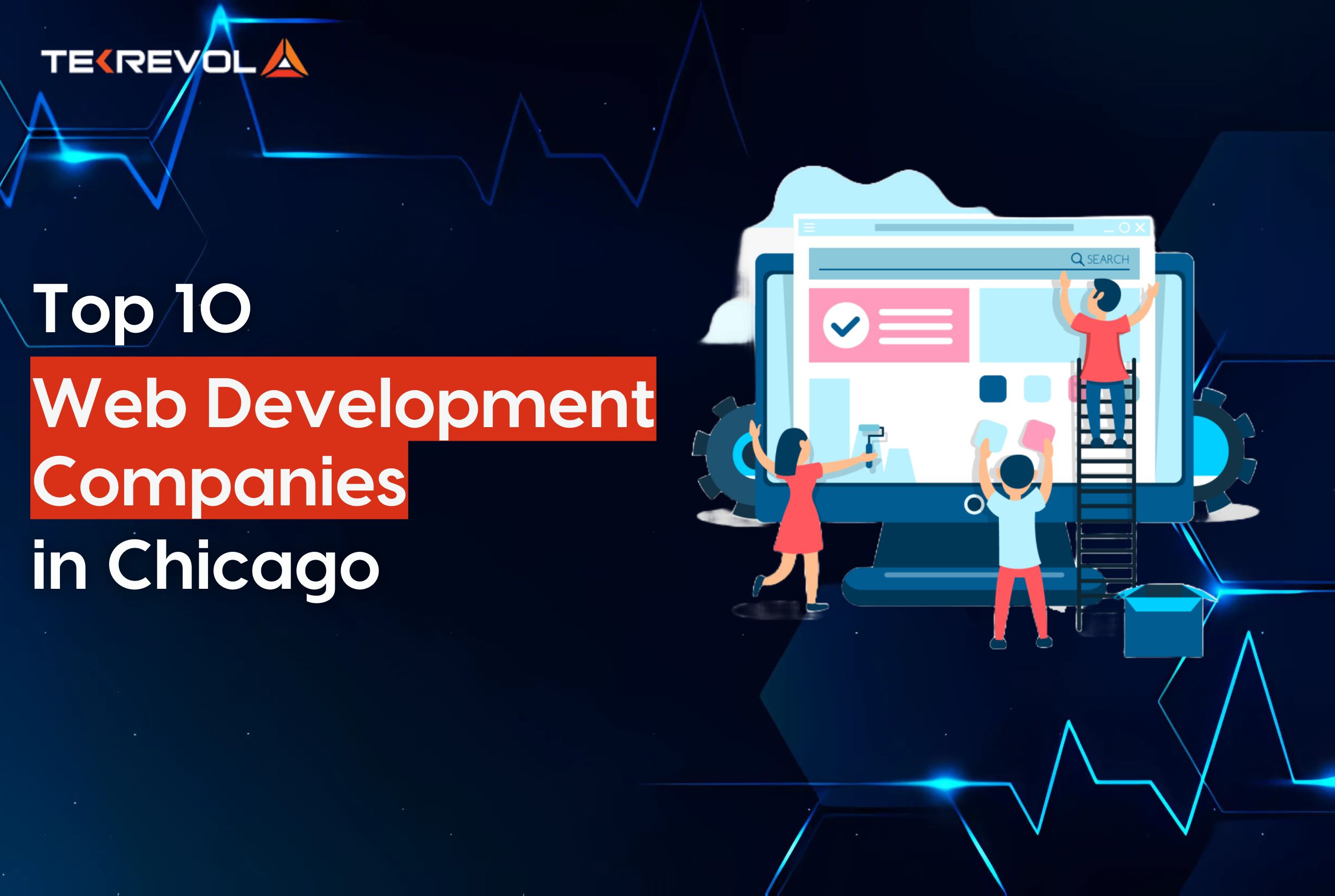If I ask you to name a few of the successful mobile apps that you use on a daily basis, you would probably come up with a list of the most successful and widely used apps. But what if I told you there are numerous applications that were developed with a similar perspective, but couldn’t do well in the market.
As an entrepreneur, if you are equally interested in the mobile app industry, you would know there are nearly 2.7 billion apps on Google Play Store and 2.2 million on Apple App Store. But how many have you heard of? Let’s say a few hundreds of them.

Source: TechJury
Now, the question is, why just a few of them? Have you ever wondered what led some of these mobile apps to gain significant user attention? It simply comes down to the idea, efforts, and techniques put into them while developing an app.
This article will give you the answers to all these whats and whys regarding mobile application development. So here’s a fool-proof recipe of “How to make a successful mobile app” and the best practices to make sure your app reaches your audience in the most effective way.
As they say, a successful app combines three aspects: market, user, and the product itself. All these factors need to work together to develop a successful mobile app and ensure a better user experience.
To better explain the best way to make an app successful, I divided the steps into three categories.

How to Create a Successful App – User-Centric Aspects

From an entrepreneur’s perspective, developing a mobile application is not just putting your technical skills at work; rather it’s a combination of well-sought ideas, adequate planning, and of course, technicalities to create a project that has a purpose of serving.
When you plan to develop and publish an app with your name, there’s a lot at stake from your side, specifically, your reputation and investments. What if your app goes wrong or does not end up doing the business you were expecting?
For this reason, it’s always important to keep your work streamlined and plan well before starting with your app. To list down the steps of the process or the recipe, this is what it nearly looks like, and this is what you are required to do in each.

Image Source: TechJury

1. Most Successful Applications Start With a Great App Idea
You may call it the purpose, sole function, or query that the app targets; but having a great app idea is highly essential for any mobile app for all the reasons you think of. At the same time, the step requires you to get your glasses on and work through the internet and some research articles about what’s new and trending.
It ultimately helps you keep your strategy aligned and keeps you focused on coming up with greater and better ideas to make a good app. While I say this, I do not expect you to search on your Google engines “What are trending app ideas.” Instead, I expect you to move beyond it to have a broader and wider perspective and have a more productive, user-centric, and professional approach.
You must understand and acknowledge that having a great app idea can significantly help you transform your business and revenue completely. If you are wondering how to create a successful app and how can you evaluate whether your app idea is productive and can make it big, make sure your app;
-
- Is based on a unique application concept
- Has significant productivity and is useful
- Has scalable performance
- Appears attractive and is highly interactive
- Drives greater user engagement by serving an essential purpose
- Do you have a potential app idea that you think can make it big in the market?
Coming back to the point I made earlier when researching about your next app idea; you are required to broaden your spectrum and employ a professional approach to look for the greater good of your audience.
Conceptualizing The App Idea
Taking an example of how you can conceptualize your app idea, we can talk about WhatsApp. The app initially was an online messaging app that allowed target users to stay connected over the internet and message each other without any additional charges. However, with time more features were added to make it more interactive and engaging.
Evaluating the app idea in this case, we could say that the app was an upgraded version of the conventional messaging apps in mobile devices that required a cellular network and has some charges. WhatsApp, however, came in with zero charges and therefore was highly preferred by the audience.
Moreover, taking the example of LinkedIn allows professionals and businesses to connect, grow, and socialize on a professional scale. Now, if we look closely, the application has a similar basis and idea to that of Facebook; however, the purpose it serves is different.
Similarly, in most cases, you would observe that an app idea that did well in the market had two important things; an exceptional technological integration and a modern, scalable rendition of a conventional application.
Researching the App Idea
So, while I say that you need to research before finalizing your app idea, I expect you think out of the box, evaluate your target audience and the minor details, and speculate the purpose of your app.
When you get down with researching your potential app idea, you learn more about the competitive products that already exist in the market and the strong and weak points of these apps. This ultimately helps develop a greater understanding of your target audience, which is the entire purpose of developing an app.
Once you study more about your app users, you get to specify your niche that helps in further narrowing your app idea. Remember, your app niche can be as specific as students of an educational institute or as wide as people belonging to Generation Z.
Moving on, if we consider the methods through which you can research your niche, target audience, and the sole purpose of your app, there are several methods you can opt for. First comes down to, of course, Google.

Image Source: Statista
Now you might think I am contradicting my earlier statement, But No. Being the widely used search engine globally, not “Google-ing” for app ideas would lead you nowhere. Besides, sticking to it only can be equally non-productive for your app. So, when you start off with researching about your app, think of the following methods as well;
- Look for trends and statistics on websites like Google Trends and Statista.
- Think about online forums and the questions being asked. For instance, a widely used online forum globally, Quora, can be very assistive in understanding the user behavior and preferability.
- Try your luck with Keyword planner and evaluate the exact keywords people are searching for. It would help you in evaluating what your active users are interested in.
- Attend tech-related seminars, webinars, startups, Hackathons, etc.
- Conduct polls, questionnaires, and ask questions on social media platforms for productive user feedback.
- Learn more about the recently trending apps and the features that stand out for them.
- Get in conversation with business owners and entrepreneurs for better insight into their ideas and future endeavors.
Finalizing the App Idea
After you have conducted thorough research, evaluated the mobile app market, and shortlisted the potential ideas for your app, it’s time to finalize. At this point, you are expected to be aware of some relevant aspects of your app to continue to further steps.
Firstly, you must be aware of your app’s value proposition and specify the Unique Selling Points (USPs). Finalize the Minimum Viable Product (MVP) and that specific feature you plan to play around with.
For instance, talking about one of the favorite social media apps, Instagram, started off with a specific feature of turning your mobile photos into a square. The idea was so over-the-top and exceptional that it led to the ultimate success and ever-growing app usage.

Image Source: HootSuite
Make sure your app has a specific purpose of serving and is something that people are currently talking about.
2. A Look On The App Strategy
You have shortlisted your idea and are clear about who you are going to target with your app. Great, now is the time for technicalities, and you must think and work on all the aspects that seem technical to you.
To list down a few, this step requires you to have a complete 360˚ feature-based and technical information about your app. For instance, you must finalize your app’s name, functionalities, and user flow based on your target audience.
The functionalities of the app can generally be divided into two major categories; customer-centric and business-centric. As a mobile app helps businesses have greater reach and connectivity with their audiences, specifying these features is also critical and highly essential. Here are the customer and business-centric feature your app must have on the whole;
| Customer-Centric Features | Business-Centric Features |
|---|---|
| Interactive UI design and nice appearance | Promotes user retention |
| Caters to all the essential purposes and expectations of users. | Payment methods are smooth and quick (if any) |
| Reliable workflow and stable performance | App maintenance is easy and quick |
| Ensures data protection | Data security and protection is ensured |
| Quick and reliable access to help service | Adding updates is hassle-free and budget-friendly |
For instance, if we talk about a few popular and most played games such as Candy Crush or Pokémon Go. The former focused on employing colorful patterns, audiovisual functionalities and gave a new touch to the conventional – matching the blocks kind of game. Having an interactive and engaging idea and user interface, the app generated $1.19 billion in 2020.
While the latter integrated a complex technological intervention – Augmented Reality – with an already existing cartoon series to give mobile app users a time of their lives. Since then, there was no coming back for the game as it earned revenue worth $1.23 billion in 2020 and is still regarded as the most played game globally.
You must have a clear idea of how, when, and where you will launch your app. Specifying the technical aspects, including the platform, frameworks, and languages used, would also be included.
Additionally, finalizing your app goals and your planning is equally important. It caters to what you want your app to do when the users download it and starts using it. It also assists you in systematically analyze your app’s performance against the specified targets.
Pro Tip: Opting for a SMART goal technique can help you keep your business goals and objectives targeted and time-specified.
Similarly, specifying your revenue generation strategy as to whether it would be a paid or free app. There are numerous ways you can choose from as your monetization strategy, such as subscription charges, In-app purchases, Pay per download, and so on. for a better insight on how apps make money and what are few of the most preferred and successful monetization strategies, here’s a quick guide.
Making A Successful App – Technical Aspects (Products)
3. Design Your App
Making a successful app may require you to get into many details and work on several aspects. But, an important one when it comes to gathering your audience’s attention is your app design. Having an intricate, well-sought, and elaborative design helps app owners to interact with their users in an extended manner, ultimately making it a successful app.
One essential thing to keep in mind during the design phase is to ensure that the added functionalities suit and work well on both Android and iOS platforms if you’re developing a cross-platform app. It is inevitable that both Android and iOS have specific design guidelines that must be followed while developing the app.
In case your app is specified to any one of the mobile application platforms, you would have to cater to the guidelines of the particular platform only. This means you’ll need to finalize your app’s name, functionalities, and user flow based on your target audience, considering the guidelines for iOS app development or Android app development.
In either case, making sure that your app design does not contradict your specified platform is crucial.
Another important aspect is to finalize your app design elements and flow. You may go for a simpler approach to avoid any unnecessary hassle and complexities, or you can opt for additional graphics, animations, or sound effects for that extra flavor in your app.
For instance, while you are using Facebook on mobile and you refresh your page, a sound pops up as a signal to your swap. Or when you type in “congratulations” in a comment, balloons and ribbons fly out.

Image Source: Statista
4. Get Down to Your App Development Approach
Now is the time to get your technical skills at work and start finalizing with the development. When I talk about developing the app, I think of all the aspects that go into developing the app—the first, specifying your development approach, i.e., native, web, or cross-platform development.
Each of them comes in with its specific pros and cons on the feature and functionalities of a mobile app. However, opting for one of them goes back to your initial mobile app idea and specified technicalities.
Next, an important aspect is to choose a programming language after finalizing your app development platform. An important thing to note here is that you must have proficient skills and expertise in the language you choose to develop your app as a developer.
Having a database is equally important when you question how to create a successful app, specifically when your app has a lot to do with user’s data. There are several types and platforms that you may choose as a database for your app development.
Last but not least, as a developer, you must always make sure that the development process is adequately aligned well with the budget and time specifications of the clients. You may go for any development approach that suits your work nature, such as iterative or agile, as long as your work is streamlined.
5. App Prototyping
Now, I would say this is hands down one of the most important steps in the entire app development process. Developing prototypes refers to combining all your ideas and transforming them into a functional app with basic features.
The reason why I prefer creating a prototype first before the actual app is because it helps you present your idea to your potential smartphone users and audience to use the app. Further, it helps in analyzing and highlighting the positive points and strong aspects of your app.
As an entrepreneur, a prototype assists you in evaluating your app from every perspective, adds relevant features and functionalities, and makes improvements, so the final product is nearly perfect. You can share your prototype with your testing and quality assurance team to look for any logical and functional bugs and resolve them.
All in all, with all the mentioned benefits, prototyping your app helps in optimizing and managing the development costs and time constraints of your app.
6. Develop Your App
Well, the step is simple. Once you have finalized and specified all the major, minor, and technical details, bring out your technical skills and start working. Develop your app as a streamlined and upgraded version of your app prototype while omitting out the bugs and loopholes.
When developing your app, make sure to stick to your app’s basic functionalities and follow through with your finalized app idea and specification. Another few of the essential aspects you must keep in mind include;
- Have an easy and accessible registration system (if your app requires one)
- Make sure your MVP is secure and prioritized
- Include personalized notifications that allow you to have better user engagement and retention with your brand.
- Promote and maintain the means of communication with your users
- It’s just a suggestion but, I prefer going for a cross-platform app
- Prioritize on integrating the socializing features in your app
- Another suggestion, offer your app for free with an effective monetization strategy at work.
- Lots of information to digest? No worries, we have the solutions to all your app development related queries
7. Launch Your App
As soon as a great app is developed after a lot of brainstorming, research, prototyping, and plenty of hard work, it’s time to launch it. But even that requires proper planning, scheduling, and management. The idea is to undertake some measures and integrate some processes on the production level to ensure that it significantly targets the audience when the app is launched.
This is basically done to include appropriate software testing services to keep the app updated and well-maintained.
Integrating Analytical Tools
Employing analytical tools at work can give you a detailed picture of how well your app is doing among your audience. It gives complete details about the number of visitors, the number of downloads on your apps, the Click Through Rate, and all the relevant information that can help you in optimizing your app.
Some of the tools that can help in the process include;
- Google Analytics
- Firebase
- Preemptive
Bugs Elimination by Beta-Testing
Beta-testing is undeniably a great way to improve app performance and functionality. The process helps in adequately scrutinizing the app and provides significant analysis that ultimately helps in improving the mobile app’s functionality.
Whether you are a developer or an entrepreneur, the process helps you redefine the initial purpose and goal of your app and target audience.
Collect Useful Metrics
Since the rise in the number of mobile applications available to the users and the potentially growing competition, it has become highly essential to keep a closer eye on the app metrics. The more accurate and specific data you get to evaluate, the more targeted and result-oriented your strategies can be.
Here are the few mobile metrics you should always look into;
- Tracking funnel sales – it helps you in evaluating why a few of your in-app purchases and ad clicks failed
- Evaluating social sharing – helps in keeping an eye on the attention you gain from your target audience.
- Data correlation – evaluating the link between user demographics, user indicators, and user behaviors.
- Time and location tracking – it is important in analyzing the context in which your app was used.

Create a Successful App – Market Aspect
8. Win Big On The App Stores
Once your mobile app is out and available on the app distribution channels – the app stores – now is the time to market your app. when I asked you about how many apps, out of millions, have you heard about and use, this is the reason why they are only a few.
Once your app hits the app stores, you must improve your marketing and app optimization strategy to make sure it is seen and attracts your audience well. In most cases, 90% of the feature-rich and highly functional apps are not visible to viewers and therefore don’t do well in the market.
This is where the concept of App Store Optimization (ASO) comes in. it caters to all the tricks, tips, and techniques your digital marketer must undertake to ensure your app is adequately highlighted and reaches the maximum number of your potential user.
You may include ASO in your marketing strategy by optimizing your app’s name, descriptions, and keywords to make it more visible against your competitor’s app.
9. Promote Your App Well
The step does not have anything to do in particular with developing the app, but it is highly essential to make it successful. Creating and implementing a good marketing strategy can be helpful to refrain your app from getting all lost in the app myriad.
Therefore, to do so, there are numerous things you can add up in your marketing strategy so that you can channel your app to your target audience effectively.
- Promoting your app on social media platforms like Instagram, Facebook, and Twitter. Prioritize on platforms that are frequently used by your target audience.
- Get your app featured on successful mobile app review sites and other news portals. This will bring along some serious attention and create a significant hype about your app.
- Collaborating with influencers, bloggers, and social personas could give your app marketing the right push.
- Try publishing your app on PreApps. A site that is used for publishing apps in its early development phase – helps grow greater app-related interest and likability among the audience.
- Try out alternative app stores such as Amazon App Store, SlideMe, AppBrain, Opera Mobile Store, etc.
- Work on optimizing your search results. Improving your SEO by including specific keywords and meta descriptions can give your app a better ranking on the app store.
10. Regular Updates and Performance Support
Coming up with better and more functional updates assists in improving app performance and increase user engagement. It allows you to keep innovating and enhancing the app to have better-enhanced features and performance while maintaining its core functionality. Therefore, I suggest that while updating or maintaining your app on a periodic level, make sure to look into the following aspects;
- Functional growth and product development – Developing and introducing new features in the app.
- Quality and Productivity Assurance – improve existing features, enhance app stability, and ensure seamless functionality.
- Review your initial business and product model. Make updates to improve product stability and drive greater user engagement.
Wrapping it Up,
The procedure and steps might look like a lot but they are the most essential and rudimentary aspects you must look into when developing an app.
While developing an app, every owner would want to make sure that the app does well in its market and is able to reach its target audience in the most effective way.
Therefore, following through all the essential steps and keeping an eye on every important app development, management, and marketing aspect can help you do better. Further implementing the process would also help you in redefining your mobile app development and marketing strategies for the greater good.
Since an essential aspect of developing and publishing an app is to earn revenue and improve brand awareness, you can also keep an eye on how much money can your app make by following this process.
- A very important step that can make your app development easy and hassle-free is to connect with a team of experienced app developers

 2666 Views
2666 Views June 3, 2021
June 3, 2021